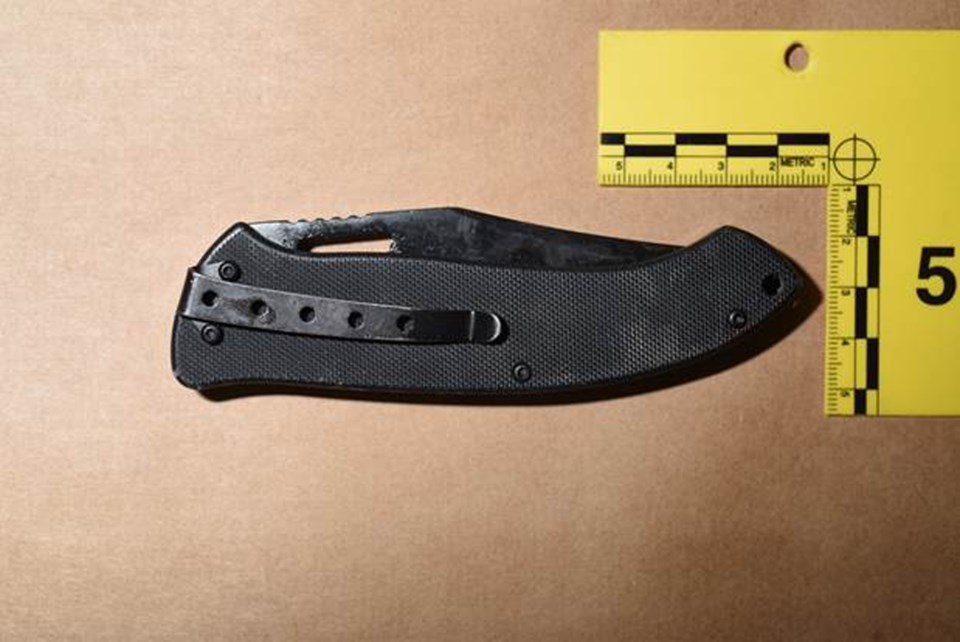Advisory: This story includes disturbing details about a murder trial. Reader discretion is advised.
A 25-year-old woman found bleeding out in a Burnaby mall stairwell two years ago suffered 15 stab wounds, five of which were "fatal or potentially fatal," according to a pathologist who testified at her boyfriend’s murder trial this week.
Everton Javaun Downey, 33, is on trial in B.C. Supreme Court in Vancouver for second-degree murder in the stabbing death of his girlfriend, 25-year-old Melissa Blimkie, at the Metropolis at Metrotown mall on Dec. 19, 2021.
Downey has admitted to stabbing Blimkie at about 11:38 a.m. that day but has pleaded not guilty to second-degree murder.
At the beginning of the trial Tuesday, Crown prosecutor Mike Myhre told Associate Chief Justice Heather Holmes, who is presiding over the judge-alone trial, that Downey does not admit how many times he stabbed Blimkie or that he caused her death.
Forensic pathologist Eric Bol, who autopsied Blimkie’s body at Burnaby Hospital two days after the stabbing, said she suffered 15 stab wounds between two centimetres and 15 cm deep.
Bol concluded Blimkie’s cause of death was "multiple stabs wounds to the body."
Five of those stabs wounds were "fatal or potentially fatal," entering her body cavity and injuring her left lung, heart, liver and left kidney.
Bol said Blimkie also sustained a number of cuts to her hands and arms.
Crown prosecutor Brendan McCabe asked if Bol thought those cuts fell into the category of "defensive wounds."
"Given their locations, yes, they could," Bol said. "Typically, defensive wounds are injuries to the hands or forearms, which may be sustained while a person is trying to ward off a sharp object."
Bol's autopsy also revealed bruising to Blimkie's forehead, under both eyes, her left cheek and right forearm.
Because of yellowing, Bol said those contusions were at least 18 hours old and not caused at the same time as the stab wounds.
Bol said the majority of the stab wounds on Blimkie's body had one blunt end and one sharp end.
"Sometimes the appearance of an injury on the body can give some evidence as to the nature of the object used," he said. "In the case of sharp-force injuries, I examine the edges of the wound to see if there's a blunt end or a sharp end, and that gives some evidence of whether this was a double-edged weapon or a single-edged weapon."
McCabe showed Bol an evidence photo of a folding knife with a blade just under 8 cm long.
McCabe asked if the knife in the photo was capable of having inflicted the injuries to Blimkie's body.
Bol said, "Yes, it could."
The Crown's theory is that the knife in the photo was the one used to stab Blimkie, according to McCabe.
According to admissions of fact presented at the beginning of the trial, police found the knife in a storage locker at one of the Metrotown apartment buildings Downey entered after the stabbing.
Downey's blood and fingerprint were found on the handle, and Blimkie's blood was found on the blade near the tip and hilt.
Toolmark analysis also determined a cut in one of Blimkie's ribs was made by the knife, according to the admissions.
During cross-examination, defence lawyer Chris Johnson asked Bol how a blade less than 8 cm long could inflict a wound 15 cm deep.
Bol said stab wounds can be deeper than the length of the blade because the body has "compliance."
"Think of being struck in the stomach or the abdomen," he said. "You can compress that skin, push that skin inwards. In the case of a knife, that knife will extend deeper into the body. When you release that pressure, that skin pulls back, leaving a longer depth than the actual blade."
Downey's trial is proceeding in four, week-long segments to accommodate the preparation of psychiatric reports and the schedules of the lawyers involved.
The next section is scheduled for the week of June 17.
Follow Cornelia Naylor on X/Twitter @CorNaylor
Email [email protected]



